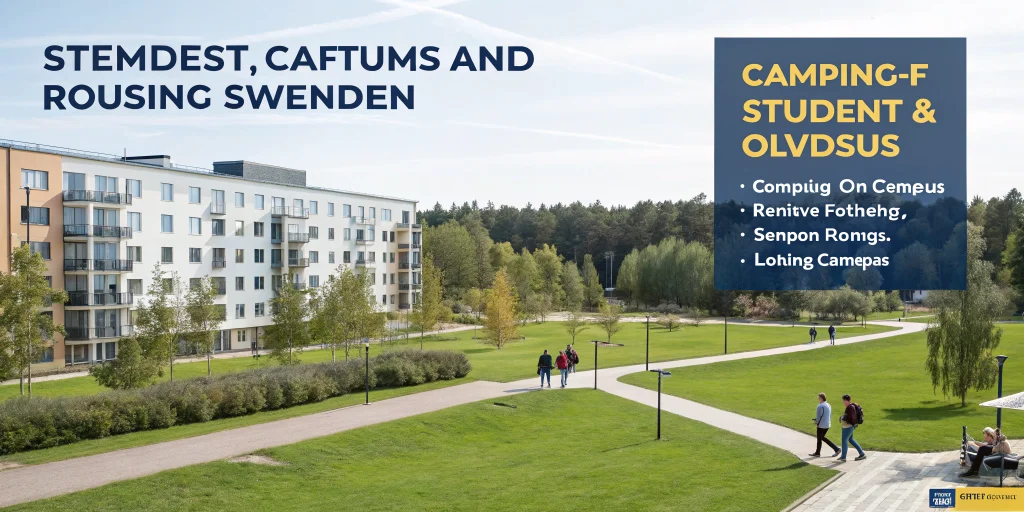Student Accommodation: Renting vs. On-Campus Housing in Sweden
Quick Navigation
- Understanding Student Accommodation Options in Sweden
- University-Provided Housing
- Private Market Rentals
- Key Considerations When Choosing Student Accommodation in Sweden
- How Study in Sweden Supports International Students
- Summary: Renting vs. On-Campus Housing in Sweden
- Take the Next Step with Study in Sweden
Understanding Student Accommodation Options in Sweden
Sweeden offers two predominant types of student housing: university-provided accommodation and private market rentals. Each comes with unique characteristics, affordability levels, and social environments that influence student life.
University-Provided Housing
For most international students, university housing is the preferred choice due to convenience, affordability, and supportive community living. Many Swedish universities collaborate with student housing organizations or manage their own residences, offering various accommodation formats.
Corridor Rooms (StudentKorridor)
Corridor rooms are the traditional and widely favored student housing format in Sweden. They provide a community-oriented living experience with a balance of privacy and social interaction.
- Typically consist of single rooms with either private or shared bathrooms.
- Share kitchens and common social areas, fostering peer engagement.
- Usually more affordable compared to private rentals.
- Promote networking opportunities among fellow students.
Benefits: This option is ideal for students looking to integrate socially while maintaining personal space and for those seeking cost-effective housing solutions.
Student Flats (StudentBostad)
Student flats or apartments are another key university-provided housing option designed specifically for student needs.
- Ranges from studios to family apartments, accommodating diverse living preferences.
- Generally more affordable than the private housing market.
- Often located close to university campuses and public transport.
- Reserved spots frequently available for international students who complete housing applications promptly and meet payment deadlines.
These flats offer a greater degree of privacy and independence while still being part of the student community.
Private Market Rentals
Renting in the private market presents an alternative for students desiring more autonomy or when university housing availability is limited. However, it comes with distinct considerations:
- Costs vary significantly based on city, neighborhood, landlord, and property features.
- Options include independent rooms, entire apartments, or shared flats.
- Private rentals tend to be more expensive than university options.
- Less likely to be situated within student-friendly environments, which may impact social life.
While private rentals offer flexibility and possibly better accommodation standards, navigating contracts, deposits, and finding trusted landlords may be challenging, especially for newcomers.
Key Considerations When Choosing Student Accommodation in Sweden
1. Timing is Critical
Securing accommodation in Sweden demands early action. The reservation process generally requires a minimum lead time of two to three months—especially for university-provided housing. International students are strongly advised to:
- Begin housing applications immediately after admission confirmation.
- Submit applications and payments ahead of deadlines to increase chances of preferred accommodation allocation.
- Avoid last-minute searches to prevent costly or unsuitable options.
As noted by Study in Sweden accommodation guidelines, early preparation is indispensable in securing affordable and convenient housing.
2. University Support and Application Procedures
Most Swedish universities offer dedicated support services for international students seeking accommodation. It is critical to:
- Identify the specific campus location of your study program.
- Complete applications tailored to that campus.
- Monitor application deadlines closely.
- Pay tuition fees or deposits as required, since housing priority often correlates with confirmed enrolment.
This institutional support can greatly simplify the accommodation process, mitigating the burden otherwise faced in the private rental market.
3. Cost and Affordability
Budget considerations are paramount. Generally, university-provided housing is more affordable than private market rentals and designed with students’ financial constraints in mind.
- Corridor rooms and student flats offer competitive monthly rents compared to city rental averages.
- Private rentals in popular urban centers like Stockholm, Gothenburg, and Malmö tend to command higher prices.
For detailed insights on budgeting accommodation in Sweden, consult our Accommodation and Budget blog post.
4. Social and Lifestyle Factors
Choosing accommodation also affects your social life and academic integration.
- University dormitories and corridor rooms encourage community interaction, making them attractive for students seeking peer engagement.
- Private rentals offer privacy but may isolate students from social networks unless proactively managed.
Students should consider their personality, study habits, and preferences when selecting housing types.
How Study in Sweden Supports International Students and Education Professionals
Navigating student accommodation options is just one element of the international study journey. At Study in Sweden, we provide tailored solutions and expert guidance for:
- International student recruiters aiming to enhance their knowledge of Swedish accommodation landscapes to better assist prospects.
- University admissions teams needing clear communication tools and insights on housing support to streamline onboarding.
- HR and marketing professionals in education who design campaigns addressing key student concerns like housing affordability and availability.
- Agencies in student placement and edtech looking for recruitment optimization within the Swedish education market.
Our platform centralizes authoritative resources, including detailed housing information, practical checklists, and best practices in student recruitment. This empowers stakeholders to deliver enhanced experiences for future international students.
Summary: Renting vs. On-Campus Housing in Sweden
| Aspect | University-Provided Housing | Private Market Rentals |
|---|---|---|
| Cost | Generally affordable and student-friendly | Varies; typically higher than university housing |
| Availability | Limited spots with priority for early applicants | More options but competitive and variable |
| Social Environment | Strong community focus, peer interaction | More privacy, less community-driven |
| Location | Often near or on campus | Varies, sometimes further from campus |
| Application Process | Formal, linked to admissions and tuition | Independent; requires contracts and deposits |
Ultimately, university-provided accommodation is the optimal choice for most international students in Sweden, balancing affordability, convenience, and community engagement. However, private market rentals serve as necessary alternatives when university housing is unavailable or for students seeking greater independence.
Take the Next Step with Study in Sweden
Planning accommodation early is vital to a smooth transition to student life in Sweden. As the leading platform for international students and education professionals, Study in Sweden offers comprehensive assistance—from housing information to recruitment strategies.

